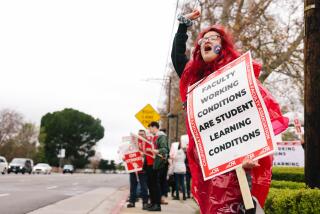Who should bear the burden of UC budget cuts?
UC Berkeley law professors Robert Cooter and Aaron Edlin are such ... economists! And they’re such men. (They are also brilliant and friends of mine, but that’s not the point here.)
In their July 16 Op-Ed article, “UC system: layoffs, not pay cuts,” Cooter and Edlin suggest that the way to solve the University of California system’s budget crisis is to lay people off, not to cut salaries across the board. “With employees paid up to 20% below what peer institutions pay ... the best people will leave,” they note plaintively.
They argue, quite correctly, that a crisis is an ideal time to think critically about an institution’s mission and how it goes about doing its business. Layoffs, they say, would respond to the institutional bloat that stifles creativity and productivity. But as the nation ponders what Supreme Court justice nominee Sonia Sotomayor meant by her “wise Latina” remark, this case shows us what she had in mind.
Despite the fact that Cooter and Edlin are unquestionably outstanding members of UC Berkeley’s law school, note what gets left out of their story. They argue for “staff” layoffs, but when looked at closely, what they really mean is layoffs for anyone but professors. Tenured professors, as Cooter and Edlin admit, are almost impossible to fire unless the university takes the almost unprecedented step of eliminating entire departments.
In practice, nontenured professors are likely to be safe too. It takes a long time to develop a body of work that permits a judgment about whether or not a young scholar has promise, so most departments will err on the side of caution when thinking of layoffs.
So what “staff” does that leave? Well, it leaves almost everybody who’s not a professor -- the clerical workers, the lecturers, the administrative people, the janitors, the research staff, the cooks and the groundskeepers.
Here’s where Sotomayor comes back in, appropriately enough for a discussion started by two law school professors. The “staff” lurking in the background of the Cooter and Edlin Op-Ed article are disproportionately women and people of color, and they work for wages even further below the prevailing market because they lack the bargaining power of professors and the ability to pull up stakes to move to better options. More important, many of them work at UC because they have a moral commitment to what the university system represents at its best: a chance for a better future for individuals and for communities. Yet their contributions are often invisible precisely because of who they are and because circumstances kept many of them from getting the advanced degrees they would have gotten in a world where talent was unerringly recognized and rewarded.
Along with Cooter and Edlin, I’m a professor in the law school (and a woman) with 35 years of experience teaching in the UC system, 25 of them here at Berkeley. The fact of the matter is that the staff I am most familiar with already work overtime and routinely do things not in their official job descriptions. One employee I know informally runs her department’s computer operations, mentors graduate students, plots strategy and tactics to get what the department needs from the administration, and does fiscal planning and budgeting to keep things moving for her professorial colleagues, many of whom are blissfully unaware of how much she really does.
Another staff colleague makes sure thousands of letters that will determine a young person’s future get to the right people at the right time -- and in a very, very tight time frame. Another struggles daily to keep a department afloat, retaining her own most outstanding workers in the face of relentless budget cuts.
Berkeley, like the rest of the UC system, is lucky to have these dedicated, morally committed men and women who put up with low salaries and lack of respect from many faculty because they care. And that is one of our most precious resources, something that once destroyed cannot easily be rebuilt. Markets are a good way to think about, well, markets, but they are a bad way to think about loyalty, commitment and moral values not easily translated into dollars.
Yes, let’s do follow Cooter’s and Edlin’s advice and think critically and carefully about how the university goes about its business. But let’s take it a step further and have an outside agency do the analysis, rather than the tired “self-study” we usually engage in. My hunch is that a “comparable worth” analysis of how hard and how effectively people work on the Berkeley campus -- and in the UC system generally -- will lead to some eye-opening results.
If I’m right, and if the measure is how much an individual contributes to the institution’s core mission, many professors will find themselves just a little bit humbler, and many staff will find themselves with much healthier paychecks.
Kristin Luker is a professor of law and sociology at UC Berkeley.
More to Read
A cure for the common opinion
Get thought-provoking perspectives with our weekly newsletter.
You may occasionally receive promotional content from the Los Angeles Times.






